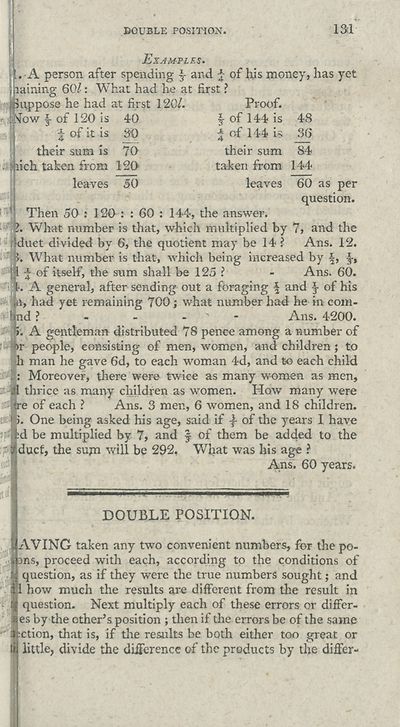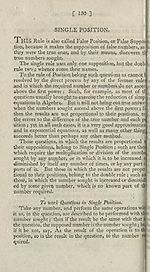Download files
Complete book:
Individual page:
Thumbnail gallery: Grid view | List view

DOUBLE POSITION.
131
Examples.
. A person after spending 5- and £ of hjs money, has yet
mining 60/: What had he at first ?
Suppose he had at first 120/. Proof,
tfow £ of 120 is 40 £ of 144 is 48
f of it is 30 i of 144 is 36
their sum is 70 their sum 84
• lich taken from 120' taken from 144
leaves 50 leaves 60 as per
question.
Then 50 : 120 : : 60 : 144, the answer.
What number is that, which multiplied by 7, and the
duet divided by 6, the quotient may be 14 ? Ans. 12.
' '. What number is that, which being increased by
. ^ of itself, the sum shall be 125 ? - Ans. 60.
■. A general, after sending out a foraging \ and §■ of his
n, had yet remaining 700; what number had he in com-
| nd ? - - - - Ans. 4200.
A gentleman distributed 78 pence among a number of
>r people, consisting of men, women, and children; to
h man he gave 6d, to each woman 4d, and to each child
: Moreover, there were twice as many women as men,
l thrice as many children as women. How many were
re of each ? Ans. 3 men, 6 women, and 18 children,
i. One being asked his age, said if -f of the years I have
d be multiplied by 7, and | of them be added to the
duct, the sum will be 292. Wliat was his age ?
Ans. 60 years.
DOUBLE POSITION.
AVING taken any two convenient numbers, for thepo-
pns, proceed with each, according to the conditions of
question, as if they were the true numbers sought; and
l how much the results are different from the result in
question. Next multiply each of these errors or differ-
es by the other’s position ; then if the errors be of the same
action, that is, if the results be both either too great or
little, divide the difference of the products by the differ-
131
Examples.
. A person after spending 5- and £ of hjs money, has yet
mining 60/: What had he at first ?
Suppose he had at first 120/. Proof,
tfow £ of 120 is 40 £ of 144 is 48
f of it is 30 i of 144 is 36
their sum is 70 their sum 84
• lich taken from 120' taken from 144
leaves 50 leaves 60 as per
question.
Then 50 : 120 : : 60 : 144, the answer.
What number is that, which multiplied by 7, and the
duet divided by 6, the quotient may be 14 ? Ans. 12.
' '. What number is that, which being increased by
. ^ of itself, the sum shall be 125 ? - Ans. 60.
■. A general, after sending out a foraging \ and §■ of his
n, had yet remaining 700; what number had he in com-
| nd ? - - - - Ans. 4200.
A gentleman distributed 78 pence among a number of
>r people, consisting of men, women, and children; to
h man he gave 6d, to each woman 4d, and to each child
: Moreover, there were twice as many women as men,
l thrice as many children as women. How many were
re of each ? Ans. 3 men, 6 women, and 18 children,
i. One being asked his age, said if -f of the years I have
d be multiplied by 7, and | of them be added to the
duct, the sum will be 292. Wliat was his age ?
Ans. 60 years.
DOUBLE POSITION.
AVING taken any two convenient numbers, for thepo-
pns, proceed with each, according to the conditions of
question, as if they were the true numbers sought; and
l how much the results are different from the result in
question. Next multiply each of these errors or differ-
es by the other’s position ; then if the errors be of the same
action, that is, if the results be both either too great or
little, divide the difference of the products by the differ-
Set display mode to:
![]() Universal Viewer |
Universal Viewer | ![]() Mirador |
Large image | Transcription
Mirador |
Large image | Transcription
| Antiquarian books of Scotland > Education > Complete treatise on practical arithmetic and book-keeping > (145) |
|---|
| Permanent URL | https://digital.nls.uk/114435310 |
|---|
| Description | Thousands of printed books from the Antiquarian Books of Scotland collection which dates from 1641 to the 1980s. The collection consists of 14,800 books which were published in Scotland or have a Scottish connection, e.g. through the author, printer or owner. Subjects covered include sport, education, diseases, adventure, occupations, Jacobites, politics and religion. Among the 29 languages represented are English, Gaelic, Italian, French, Russian and Swedish. |
|---|

